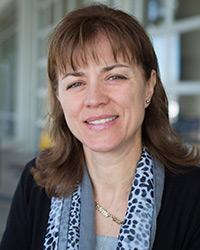Center Coordinator Building Learning Community
 Petia Gueorguieva joined campus seven years ago as a lecturer, teaching courses in chemistry and student success.
Petia Gueorguieva joined campus seven years ago as a lecturer, teaching courses in chemistry and student success.
When the campus’s STEM Resource Center opened in 2013, she took the lead role in running it. STEM is a frequently used acronym for science, technology, engineering and math.
Gueorguieva obtained her master’s in science education from Sofia University in Sofia, Bulgaria, and her Ph.D. in chemistry from Louisiana State University, Baton Rouge. Her family moved to Merced in 2007, after spending three years in the Bay Area, where she taught chemistry at Peralta Community College District and at Delta College, Tracy Center.
What made you interested in becoming the resource coordinator for the STEM center? What do you do in this role?
I have been involved in various areas of higher education in the past 19 years and early on I realized that students’ high academic achievement must be a main priority in undergraduate education. As a lecturer in the School of Natural Sciences, I had the opportunity to develop the curriculum for a student-success course and create a platform for exposing students to a number of academic accomplishment topics, various aspects of scientific research and interaction with faculty members. This experience and the support I received from my family motivated me to apply for the STEM Resource Center coordinator position when it was advertised. I was confident that the position would unveil advanced opportunities for promoting student success through direct interactions with a greater number of UC Merced undergrads and organizations via participation in enrichment programs, seminars and workshops.
The STEM Resource Center’s mission is to build a learning community and enhance social and academic experiences for UC Merced undergraduates pursuing degrees in science, engineering and math. We are dedicated to supporting our students in finding research and internship opportunities, and building lifelong skills needed for advancement and leadership in STEM careers. In respect to the above, I mentor students, consult an average of 20 students each week one-on-one and oversee our Tutor/Mentor Program, which assists about 20-25 students per day. We have 13 volunteer and five paid peer tutors/mentors, and all of them do an outstanding job in serving our campus community.
With the purpose of further expanding our undergrad success initiatives, I work closely with the Center for Career and Professional Advancement and the Undergraduate Research Opportunities Center. I collaborate on projects with the School of Natural Sciences and the School of Engineering faculty and staff members and colleagues from Lawrence Livermore National Laboratory, University of Illinois at Urbana-Champaign (UIUC), Purdue University and CSU Stanislaus. I also work with student organizations on campus, such as Vanguard, ACS student chapter, Science Alliance, SACNAS and NSCS, and develop outreach activities with local schools.
What is the most rewarding part of your job?
I love working with our students. I continue to enjoy an excellent relationship with UC Merced’s undergrad students, which we have established through the years while I was a lecturer. It is highly satisfying to witness students’ academic progress and seeing them succeed. For example, in the past week, I received the news that one of my former students was accepted into medical school, one was offered a summer research scholarship, one got a fellowship and one joined a research lab on campus. I understand we cannot always have this much good news, but my students and I work together to see this happening as often as possible.
On the other hand, I find it very rewarding to play a major role in the establishment of a new initiative that has proven to be very successful. Less than a year ago the STEM Center existed only on paper. Now we are a reality and hold high expectations for our undergrads. We meet them at their own level, guide them to succeed academically and relish their accomplishments.
What new initiatives/projects/plans are you looking forward to this year?
The STEM Resource Center is now up and running, but our work is far from being done. In partnership with UC Merced faculty and staff members, I am looking forward to establishing local internships and paid undergrad research opportunities. For example, the NanoBIO Scholarship Program will provide a chance for five students to conduct research at UC Merced and University of Illinois at Urbana-Champaign. Naturally, there always are housekeeping items to be taken care of – presently, we are implementing the iCatCard check-in.
Further on, we plan to analyze the STEM Center’s data collected during our first year (in collaboration with Institutional Planning and Analysis) and design and administer surveys to evaluate our performance (in collaboration with Students Assessing Teaching and Learning (SATAL) services). In a longer term, we are planning on pursuing external funding through our STEM Center proposals and through cooperation on institutional proposals. Of course, I look forward to continue working with my colleagues and student workers with the ultimate goal of helping our undergrads to flourish in their intellectual endeavors.
What are some of the biggest challenges in your work and how do you overcome them?
Each week, I meet with students, colleagues and collaborators, and work on several entirely different projects that have close due dates. I have learned to switch to a completely unrelated topic in a matter of a minutes. I always had the ability to manage my time and duties well, but now I coordinate my weeks much more wisely.
Tell us something about yourself that most people on campus wouldn’t know.
When faced with a difficult problem, I turn for advice to my family and friends and discuss possible resolutions while enjoying a cup of coffee and a fine chocolate.
